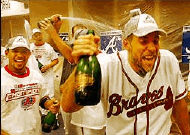Congressional Hearings on Steroids in Baseball
The House Government Reform Committee, which has zero jurisdiction over sports or health care, began its hearings into steroid use in Major League Baseball today, getting testimony from several current and former players. From the hour or so worth I listened to on the radio or have seen on television (live coverage has preempted regular programming on the news channels) the players are coming across as much more serious and sophisticated than the Members.
McGwire won't be 'naming names' in testimony (SI-AP)
Retired slugger Mark McGwire told Congress' investigation of drugs in baseball that he would not "participate in naming names" of players who used steroids. McGwire, one of six current and former stars appearing Thursday before the House Government Reform Committee, did not say whether he used steroids. He said his lawyers advised him not to answer certain questions. "If a player answers, 'No,' he simply will not be believed," McGwire said. "If he answers, 'Yes,' he risks public scorn and endless government investigations."[...] McGwire, choking back tears, said he knew that steroid use could be dangerous and would do whatever he could to discourage young athletes from using them. "What I will not do, however, is participate in naming names and implicating my friends and teammates," said McGwire, who ranks sixth in major league history with 583 homers.
Most will take McGwire's refusal to say he didn't use steroids as proof that he did. However, given the farcical nature of these hearings, one can hardly blame him.
See also:
- Fans get in line early to watch the hearings
- Waxman: 'Baseball did nothing over the years'
- 'The truth needs to come out'
- Congress bashes baseball for 'puny' testing policy
- Players ho-hum about hearings
Update: FindLaw Columnist Edward Lazarus disagrees that the GRC has no jurisdiction here and thinks congressional investigation of this matter is a wonderful idea.
The Government Reform Committee is the principal investigative committee of the House. It possesses oversight jurisdiction to conduct investigations of any matter falling under the purview of the legislature. Without question, the issue of steroids in baseball qualifies as a matter within the power of Congress to oversee and regulate. After all, the use of performance enhancing drugs is governed by federal statute, specifically the Federal Controlled Substances Act. Thus, it is simply beyond cavil that steroid use in baseball is within the purview of the Government Reform Committee.
Oddly enough, the Committee itself doesn't claim anything near that scope of power [PDF format] :
The Committee on Government Reform has existed in varying forms since 1816. It first appeared as the Committee on Expenditures in the Executive Departments, which was created in 1927 by consolidating the 11 Committees on Expenditures previously spread among the various departments of the government to oversee how taxpayer monies were spent. The Committee’s immediate predecessor, the Committee on Government Operations, was established in 1952. The name change was intended to communicate to the outside world the primary function of the committee: to study “the operations of Government activities at all levels with a view to determining their economy and efficiency.” It is the Committee’s government-wide oversight jurisdiction that sets it apart from other House committees.
On January 4, 1995, Republicans assumed control of the House of Representatives for the first time in over 40 years. Republicans immediately implemented several internal reforms of the House, including one that applies all of the laws the rest of America lives under to Congress, and another that downsizes the congressional committee system. Perhaps more than any other committee, the Government Reform Committee embodied the changes that occurred. The Committee’s name was changed to highlight the Republican view that the federal government needs to be reformed to ensure accountability. The Committee on Government Reform is unlike most other committees in that its jurisdiction has grown. While retaining the agenda of the former Committee on Government Operations, the Committee also has the responsibilities of the former Committee on Post Office and Civil Service and the Committee on the District of Columbia. The Committee now has seven subcommittees responsible for the same jurisdiction previously covered by 3 full committees and 14 subcommittees. This consolidation has resulted in hundreds of millions of dollars in budget savings and a nearly 50 percent cut in staff. The Committee’s government-wide oversight jurisdiction and expanded legislative authority make it one of the most influential and powerful committees in the House. The Committee serves as Congress’ chief investigative and oversight committee, and is granted broad jurisdiction because of the importance of effective, centralized oversight. Because it authorizes on a few agencies and programs, it is able to review government agencies and programs with an unbiased eye.
So, even in this broadly expanded mission, it's job is still to reform the operations of the government itself.
I don't disagree with Lazarus that Congress has some interest in the operation of baseball as a business, although its unclear how the steroids issue impacts interstate commerce. Nor do I disagree that cleaning up the sport would have all manner of salutory effects. I just disagree that it's the job of Congress, let alone a committee charged with cleaning up the government itself. Although, if they actually get the government to the point where it no longer needs any reform, I'll gladly remain quiet while they clean up team sports.
via OTB

